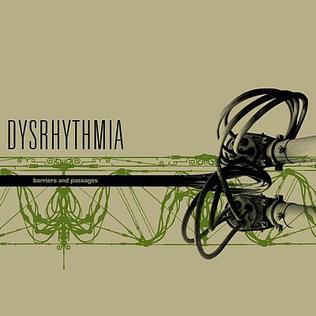| No Interference | ||||
|---|---|---|---|---|
 | ||||
| Studio album by | ||||
| Released | 2001 | |||
| Genre | Avant-garde metal | |||
| Length | 56:27 | |||
| Label | self-released | |||
| Dysrhythmia chronology | ||||
| ||||
No Interference is an album by Dysrhythmia. It was rereleased in 2005 on Translation Loss Records with live bonus tracks.
| No Interference | ||||
|---|---|---|---|---|
 | ||||
| Studio album by | ||||
| Released | 2001 | |||
| Genre | Avant-garde metal | |||
| Length | 56:27 | |||
| Label | self-released | |||
| Dysrhythmia chronology | ||||
| ||||
No Interference is an album by Dysrhythmia. It was rereleased in 2005 on Translation Loss Records with live bonus tracks.
| No. | Title | Length |
|---|---|---|
| 1. | "Body Destroyed, Brain Intact" | 3:01 |
| 2. | "Craving for Transformation" | 4:15 |
| 3. | "No Interference" | 7:20 |
| 4. | "Circulatory System Overhaul" | 6:34 |
| 5. | "Let You Fall" | 10:51 |
| 6. | "Orbiting" | 6:59 |
| 7. | "Nutritional Facelift" | 3:03 |
| 8. | "Slumlord" | 3:59 |
| 9. | "We Lead the Way" | 3:54 |
| 10. | "Psychic Desolation" | 4:40 |
| 11. | "Four, Five, Six Minutes Late" | 1:51 |

Digitalis is a genus of about 20 species of herbaceous perennials, shrubs, and biennials commonly called foxgloves.
TCD can be used as:
EAD may refer to:

Dimenhydrinate, marketed as Draminate, Dramamine and Gravol among others, is an over-the-counter drug used to treat motion sickness and nausea. Dimenhydrinate is a combination drug of diphenhydramine and 8-Chlorotheophylline.
Cough CPR is the subject of a hoax email that began circulating in 1999. It is described as a "resuscitation technique" in which through prolonged coughing and deep breathing every 2 seconds, a person suffering a cardiac dysrhythmia immediately before cardiac arrest can keep conscious until help arrives. Neither the American Heart Association nor the American Red Cross endorses cough CPR during a heart attack.
Cardiac nursing is a nursing specialty that works with patients who suffer from various conditions of the cardiovascular system. Cardiac nurses help treat conditions such as unstable angina, cardiomyopathy, coronary artery disease, congestive heart failure, myocardial infarction and cardiac dysrhythmia under the direction of a cardiologist.

Barbexaclone (Maliasin) is a salt compound of phenobarbital and levopropylhexedrine. It was introduced in 1983. It has been reported to be as effective as phenobarbital but better tolerated; however, as of 2004, these "promising results" had not yet been confirmed nor denied in controlled trials.
Thalamocortical Dysrhythmia (TCD) is a theoretical framework in which neuroscientists try to explain the positive and negative symptoms induced by neuropsychiatric disorders like Parkinson's Disease, neurogenic pain, tinnitus, schizophrenia, obsessive–compulsive disorder, depressive disorder and epilepsy. In TCD, normal thalamocortical resonance is disrupted by changes in the behaviour of neurons in the thalamus.
TCD can be treated with neurosurgical methods like the central lateral thalamotomy, which due to its invasiveness is only used on patients that have proven resistant to conventional therapies.

Dysrhythmia is an American instrumental progressive metal band formed in Philadelphia, Pennsylvania in 1998. The band's music combines avant-garde elements of progressive rock and jazz with heavy metal. They are currently located in Brooklyn, New York.

Pretest is an album by progressive rock band Dysrhythmia. It is their third full-length overall and their first release on Relapse Records.

Barriers and Passages is the fourth album by Progressive rock band Dysrhythmia. It is their first to feature bassist Colin Marston.

Colin Marston is an American multi-instrumentalist musician and record producer residing in New York City. He graduated from New York University with a Bachelor of Arts degree in music technology in 2004, and runs Menegroth The Thousand Caves Recording Studios in Woodhaven, Queens while not on tour with one of a number of bands. He also known for his performances in acts such as Behold... The Arctopus, Dysrhythmia, Krallice, and the reunion lineup of Gorguts. Marston has produced, mastered, and mixed music for artists such as Genghis Tron, Kayo Dot, Jarboe, Capillary Action, Origin, Panopticon, Altar of Plagues, Liturgy, Pyrrhon, and Orthrelm, as well as for his own bands.

Pulsus bigeminus is a cardiovascular phenomenon characterized by groups of two heartbeats close together followed by a longer pause. The second pulse is weaker than the first. Look for a pattern of what appears to be a relatively normal QRS complexes, each followed by a smaller, abnormal one. The smaller beat is palpated as either a missing or an extra beat, and on EKG resembles a PVC. These PVCs appearing every other beat are also called extrasystoles.
Dysrhythmia may refer to:
Reentrant or re-entrant can refer to:

Digoxin toxicity, also known as digoxin poisoning, is a type of poisoning that occurs in people who take too much of the medication digoxin or eat plants such as foxglove that contain a similar substance. Symptoms are typically vague. They may include vomiting, loss of appetite, confusion, blurred vision, changes in color perception, and decreased energy. Potential complications include an irregular heartbeat, which can be either too fast or too slow.

Byla is an American ambient duo, formed in Brooklyn, NY in 2003 by Colin Marston and Kevin Hufnagel (Dysrhythmia). They released their eponymous debut album in 2005.

Test of Submission is an album by the band Dysrhythmia. It is their first album with Profound Lore Records.

Two Generations of Brubeck is a 1973 studio album by Dave Brubeck accompanied by his sons Darius, Chris and Dan.
Dysrhythmia's official website
| This 2001 rock album–related article is a stub. You can help Wikipedia by expanding it. |